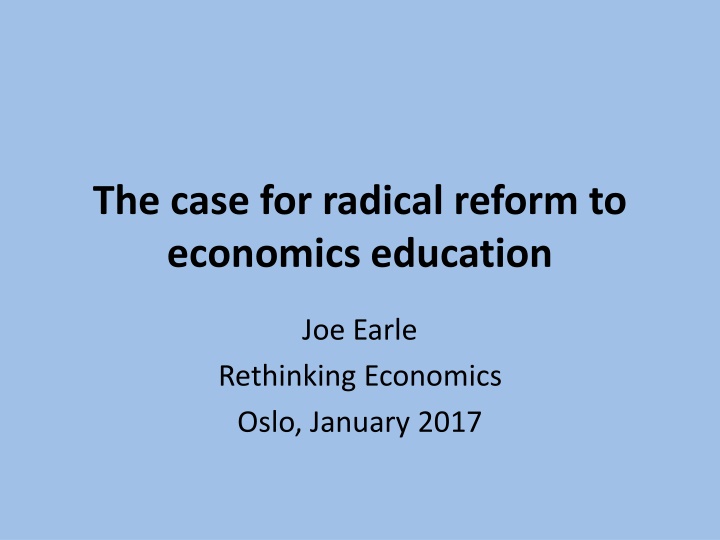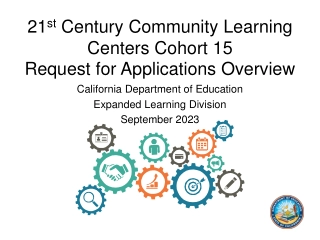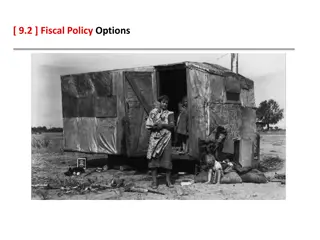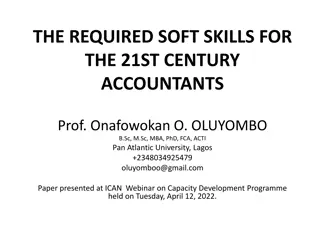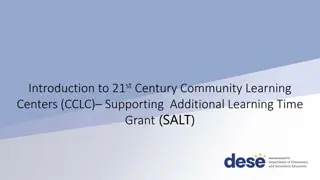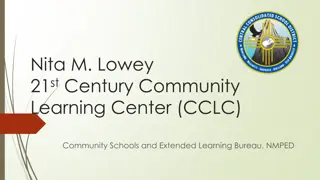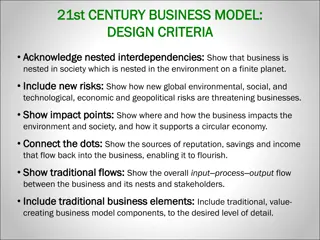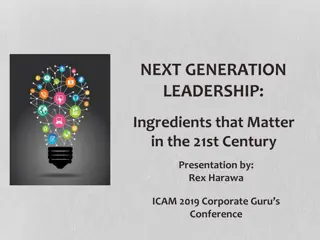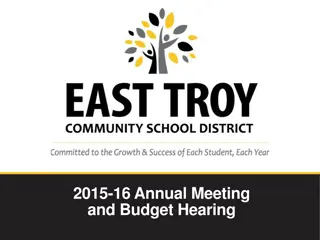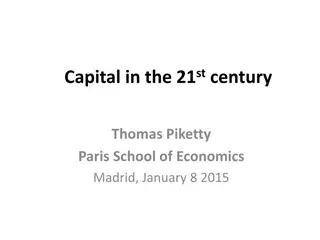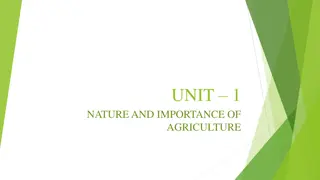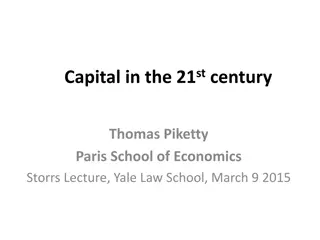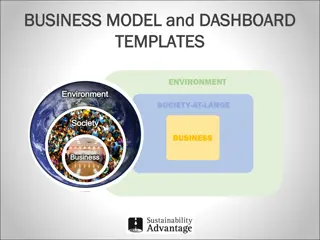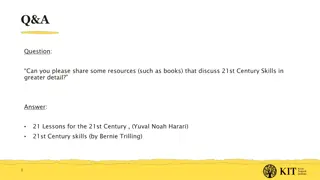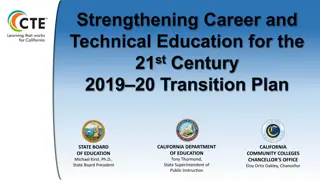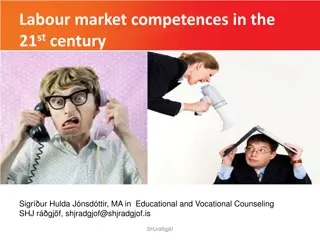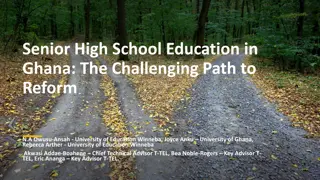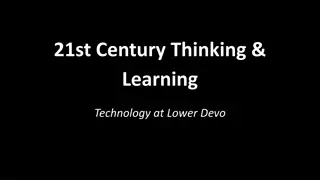Rethinking Economics Education for the 21st Century
Challenging the current state of economics education, Joe Earle highlights the shortcomings in traditional approaches, emphasizing the need for a radical reform. The critique includes a lack of real-world connection, absence of economic history, dominance of a singular perspective, and a disregard for ethical and political dimensions. Through a comprehensive curriculum review, concrete evidence is presented to support the call for change and the shift towards a more diverse and inclusive economic education model.
Download Presentation

Please find below an Image/Link to download the presentation.
The content on the website is provided AS IS for your information and personal use only. It may not be sold, licensed, or shared on other websites without obtaining consent from the author.If you encounter any issues during the download, it is possible that the publisher has removed the file from their server.
You are allowed to download the files provided on this website for personal or commercial use, subject to the condition that they are used lawfully. All files are the property of their respective owners.
The content on the website is provided AS IS for your information and personal use only. It may not be sold, licensed, or shared on other websites without obtaining consent from the author.
E N D
Presentation Transcript
The case for radical reform to economics education Joe Earle Rethinking Economics Oslo, January 2017
My background Co-founder Post-Crash Economics Society at the University of Manchester Co-author of Economics, Education and Unlearning: Review of economics at Manchester Trustee of Rethinking Economics Co-author of The Econocracy: the perils of leaving economics to the experts
Foreword by Andy Haldane 9.99 available online People like it! Every economist and citizen should get a copy. Vince Cable, former Secretary of State for Business, Innovation and Skills Beautifully written and packed with wisdom...this may be the most important economics book of the decade. Mark Buchanan, physicist, former editor of Nature and New Scientist
So what is wrong with economics? I had always thought of economics as a lively debate. Until I started university, that is. I could have read the Financial Times and the Economist for the past 100 hundred years and I wouldn t have got a single extra point [in my exams] It was as if we d walked into a very specifically prepared room and we just had to accept that. And I just remember thinking, is this really what it s all about?
The charge sheet Abstract and disconnected from the real world Absence of economic history and history of economic thought Dominated by a single perspective leading to a lack of debate and open questions Silencing of ethical and political aspects of economics Not helping us understand or shape the world in the early 21stcentury
The curriculum review Curriculum review of 7 universities and 172 modules All course outlines and final exams Manchester, LSE, Cambridge, Sheffield, Exeter, Queen s University Belfast and Glasgow Aim to provide concrete and undisputable evidence for our criticisms of economics education
Defining Neoclassical Econ Individualism Optimisation Equilibrium
A way of viewing the world Neoclassical economics is based on a mechanical view of the world. Economies are composed of individual agents who interact based on well-behaved, predictable mathematical rules. What s more, their behaviour tends to produce a situation which, though not necessarily ideal, is stable. In this sense economies are not unlike pendulums: they may move violently back and forth in the short term, as agents adjust their behaviour, but they always return to equilibrium eventually. Agents know what they are doing and are in an environment where they can act in the best way possible given the information they have.
Summary of findings Undergraduate economics education across our sample is monopolised by neoclassical economics The structure and content of degrees is very similar Critical and independent thinking skills are utterly neglected Disconnected from the real world History of economic thought is rare and optional
The Monopoly Alternative perspectives only mentioned in 17 modules and at Cambridge they aren t mentioned at all. 5 of these 17 modules are History of Economic Thought courses Only 12 of the 23 Russell Group universities run HoT courses A whole generation of economists is being taught only framework through which to study the economy
Models that fall from heaven 56% of all the macro and micro modules studied and 48% of all 172 exams studied consist of operating a model Only 3% attempted any link to the real world. Confused students report the process of having learnt to solve models before even knowing what a model is and what its purpose is .
11. Consider a two-period economy in which the representative consumer maximizes the life-time utility function ? ?1,?2 = ? ?1 + (1 + ?)??(?2) subject to the life-time budget constraint 1 + ? ?1+?2 1, W is the present value of after-tax life-time income, t is the VAT tax rate, and ? = 1 + ?, where r is the interest rate. (a) [3 marks] Show that the optimality condition relating ?1and ?2is the following: ? ?1 = (1 + ?)??? (?2) ?= ?, where 0 < ? <
Question 7: A risk-averse agent with von-Neumann Morgenstern utility function ? ?,? = 100,000 ?, where w denotes his wealth and a the unobservable cost of effort, could be employed by a monopolistic principal to perform a task. This task yields a profit of 7,500 when it is a success and a profit 5,000 when it is a failure . The probability of success or failure depends on the effort put in by the agent. If the agent puts in no effort (? = ??= 0) the probability of failure is 100%. If the agent puts in high effort (? = ??= 0) the probability of failure is reduced to 0 < ? < 0.5. If the agent decides not to be employed by the principal, he receives the reservation utility ?0= 20. ?
Disconnected What international institutions like the IMF and World Bank do and how they are run. How multinational firms like Apple and Glencore operate in practice Financial system or how banks and other financial institutions operate The Great Depression, Bretton Woods, East Asian Financial Crisis and the Gold Standard. Current economic debates e.g. immigration, EU membership, financial regulation/reform.
Indoctrination? Indoctrinate, verb, Teach (a person or group) to accept a set of beliefs uncritically Training in neoclassical economic not an education in which you are taught to think for yourself. Only 22% required students to illustrate any critical or independent thinking in exams and this went down to 6.7% for compulsory modules.
Module Percentage of marks for evaluation Economics B 5.8% Macroeconomic Principles 8% Microeconomic Principles 0 Microeconomic Principles 2 0 Behavioural Economics 4.4% Advanced Economic Analysis 3.3% Development Economics 34.7% Economic Policy Analysis 26.7% Economic Theory and it s applications 0 Labour Economics 18% Monetary Economics 20% Public Economics 25% History of Economic Thought 91.6% Industrial Economics 8.4% International Economics 18.5% Political Economy 6.8%
Economics as a critical, pluralist and liberal education
Contrasting views The master-economist must possess a rare combination of gifts .... He must be mathematician, historian, statesman, philosopher John Maynard Keynes, 1936 "The combined assumptions of maximizing behaviour, stable preferences, and market equilibrium, used relentlessly and unflinchingly, form the heart of the economic approach as I see it. Gary Becker, 1976
What is the economy? Our view: the economy is evolving, complex and contested and a particular part of wider social organisation. Economics is the study of the economy. Very different from economics as the study of the allocation of scarce resources to infinite ends
Pluralism Pluralism- the capacity to examine critically a range of explanations for observed reality and develop independent reasoned judgements about which is best in any given situation. Pluralism restores the lost academic principle of controversy to economics. Pluralism is hard to do and academically rigorous It isn t relativism or anything goes
The value of other perspectives Feminist, ecological, Austrian, post-Keynesian, complexity, institutional, Marxist, behavioural etc. Broadens our understanding of complex social reality and Different perspectives have different, strengths, weaknesses and blind spots. Puts experts back in their place of providing possible options with their own explicit judgement not the right answer.
Different visions of the world An individualistic world with no limits, where natural resources are just one of many available inputs to production, wants are endless, welfare is primarily a function of material consumption, and growth in the size of the economy is the primary objective. A world in which the economy is a subsystem of the ecosystem (and the social system) and where well-being is determined by a range of factors, only some of which are quantifiable.
Going back to the future? An approach to college learning that empowers individuals and prepares them to deal with complexity, diversity, and change. This approach emphasizes broad knowledge of the wider world (e.g., science, culture, and society) as well as in- depth achievement in a specific field of interest. It helps students develop a sense of social responsibility; strong intellectual and practical skills that span all major fields of study, such as communication, analytical, and problem-solving skills; and the demonstrated ability to apply knowledge and skills in real-world settings .
Practical reforms Inductive approach Big economic questions development, business cycles and financial markets Peer to peer learning Reflection journals, policy briefings, newspaper op-eds, podcasts, project analysis and country analysis. Problem based learning Public education workshops and working with local communities Class debates and reverse debates
Critical, open and engaged Ability to critically engage with quantitative and qualitative arguments Independent judgement under conditions of complexity and uncertainty Reflect on why we think what we think and to be self-critical of our own beliefs and values as well as those of others. Communicating economics to non-specialist audiences and engaging with non-economists as equals
Why pluralist economists are better The economics expert today addresses all economic problems through a neoclassical framework and seek to find the one right answer. The pluralist economist makes explicit the alternative theoretical approaches relevant to any given problem, whether or not he or she agrees with them, presenting different solutions and policies, which might arise from each approach, the presuppositions on which it rests and the basis- they would give- for choosing between them.
Why is reform so urgent? Growing gap in understanding between economists and citizens. Generic and unimaginative economic policymaking cannot build healthy, prosperous societies. Economic imperialism across public policy and academia
Join the movement! Join Rethinking Economics www.rethinkeconomics.org Contribute to Economy www.ecnmy.org Explore Exploring Economics www.exploring- economics.com Sign the ISIPE Open Letter at www.isipe.net/open-letter/
